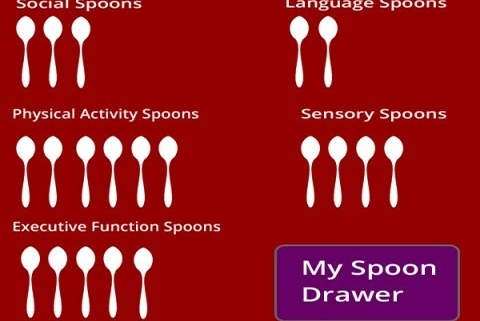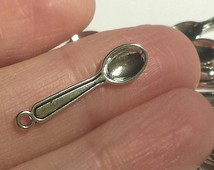Spoon Theory and Autism.
My friend @AnnMemmott who blogs at http://www.annsautismblog.co.uk first introduced me to the Spoon Theory in relation to autism. It was originally created by Christine Miserandino when asked about her chronic illness, (you can read the original post here http://www.butyoudontlooksick.com/articles/written-by-christine/the-spoon-theory/ ) but is a great way of helping us understand why school and college is such hard work for autistic children and young people (CYP) . @aspiemusings has also written a good post about how it relates to her as an autistic adult. http://musingsofanaspie.com/2014/10/15/conserving-spoons/
Let’s imagine that the social, sensory and intellectual energy an autistic person has each day can be measured in spoons.
An autistic person can start the school or college or work day with a full drawer (which may be only half as full as a typical child) or with some of their spoons already used up in dealing with the demands of getting there. Depending on various factors such as whether they slept, if their family remembered to say goodbye the right way, if their clothes are itching their skin, if their routine was changed, or any number of other seemingly incidental events, they may be starting the day with, say, only 5 spoons instead of 10.
Then they need to start using their spoons. Each set of instructions, each set of work demands, each time they have to organise themselves, follow a complex set of instructions or cope with change, and each social interaction may cost the autistic person a spoon. If there are sensory sensations that are overwhelming, then another spoon is used up in regulating and keeping calm. If they have to work in a group more than one spoon may be needed. Break times are not relaxing, another spoon or two is used up in coping with all the social interaction, noise and lack of structure. Some manage to save a spoon by shutting off, taking the time to be alone, so that they can cope with the next set of lessons.
I hope you can see what might be happening
So you have a child or young person who seems okay in the morning but always seems to lose it in the afternoon. Or they won’t join in anything at break times and paces around the perimeter of the yard or social space. Or a person who has meltdowns some days but is fine on other days. Or parents ask you what you are doing to their child as they always have a meltdown as soon as they come out of school…and getting them to do homework is impossible. You may have a colleague at work who seems not to be able to speak to you on some days, unable to socialise and seems distracted and distressed.
You might assume you need more structure in the afternoons. You might assume you need to teach the person some social skills so they can make friends at break times. You might assume the parent isn’t disciplined enough. You might put all kinds of practical support in place, but it doesn’t really work.
It may just be that the autistic person has used up all their spoons. They have no communication, organisation, sensory, social or intellectual energy left. They might just be able to keep it together in the morning, but then are far too exhausted to carry on in the afternoon. Some days there may be no spoons to deal with the things they usually seem okay with. They might even be able to keep it together through the day but cannot contain themselves in the safety and familiarity of their home. Some even manage to borrow spoons from the next day but there will be a day when there are no spoons left to borrow and the person has a major meltdown.
We can help by recognising the limited amount of spoons an autistic person may have. We can help them conserve their spoons to last through the day and we can help them find ways of finding ways to add to their supply (not as easy as it sounds). Through:
- Giving them calming sensory breaks which are timetabled and regular.
- Look at your environment and see where you can make it calmer and more accessible, considering the persons sensory needs.
- Break tasks and instructions into more manageable chunks, give them visual or written reminders so they can check them and allow them time to do each one.
- Support organisation and set up a communication system where the autistic person can let you know if they are struggling. Be aware that many find this difficult especially when it demand using a ‘communication spoon’ and they may not be able recognise that they are struggling until it is too late. But structuring tasks for them whether through a list, visual schedule, practical equipment or a writing frame can still help. It will be useful if you can learn to ‘read’ their autistic non-verbal communication and know when to reduce demands.
- Let the person do activities related to their special interests. If the topic doesn’t lend itself to this, then allow them time with their interests once the task is finished.
- Let them request ‘time out’ or a break. It is important for the autistic person to recognise when things are getting too much for them and request a break before frustration and overload leads them to communicate this in behaviours or reach the point where they cannot cope and meltdown happens. But this may take a lot of support to help them learn to recognise their pwn state.
- Let them have alone time at break times if they want to. Or give them alternative things to do, especially at lunch times. Social interaction can be encouraged at other times when they have the spoons to cope with it.
- Make sure they are able to do homework and be as flexible as possible about it. Ask yourself if they really need to do it at that point. See if there is a way they can do something more interesting to them such as a project about their special interest. Or for many of our students, homework is just the ‘straw that breaks the camels back’ and we need to cut it our altogether.
- If the person is having a minimal spoon start to the day, increase the sensory breaks, reduce the social and work demands and expect that they will find it much harder to concentrate.
If you understand the autistic person and they can trust you, they won’t take advantage of your adaptations, they will feel safe, understood and be able to cope with more challenges than maybe you thought possible. Maybe you should keep a couple of spoons on your desk with the person’s name on, and remove one when things are not going so well for them. Then think about how you would cope with just one spoon left and no way of buying any more.
Have a look at the rest of my website for free resources, information about training and courses I deliver and great autism links.
This work is licensed under a Creative Commons Attribution-NoDerivatives 4.0 International License.






Thanks Lynn….I can fully relate to the spoons theory for myself, not to mention the children you know in our setting. I had a no spoons day yesterday and the day before so this came at a perfect time! See you soon
I’ve heard exactly the same thing explained with the metaphor of a glass of water. If we start the day with ours empty, an autistic child might start the day with theirs already half full. Every request or activity adds another drop of water into the glass, meaning they are more likely to reach their limit and more quickly than others. It absolutely rings true with my son. He starts mainstream school in Sept and I have faith that they understand this premise too, But just to be on the safe side I might show them your post 😉 Thank you #SpectrumSunday
This is great, really helps me to understand my sons behavior. x #SpectrumSunday
I’ve said something similar but I reverse about our straws breaking the camels back. It’s like our son has a whole bunch more straws weighing on him and eventually one more and he’ll be over! So we try to limit the number being piled on him. Thanks so much for this, it’s a great way to see it too. Hope to see you on #SpectrumSunday this week.
This is excellent – so well explained. My son starts nursery again next week and I know his spoons will be close to used up by the time he gets home. We’re prepareing ourselves to make things as easy as possible for him when he gets home. I think this is a really simple way to explain to people who perhaps have limited experience with autism too. Thanks for sharing with #SpectrumSunday
Oooh great article. It could be said that those with Pathological Demand Avoidance have fewer spoons in the drawer to start with ?
That’s certain a good way to look at it Steph.
This is a great way of explaining how hard my sons days are. It helps me understand his reactions and when he’s reach his limits.